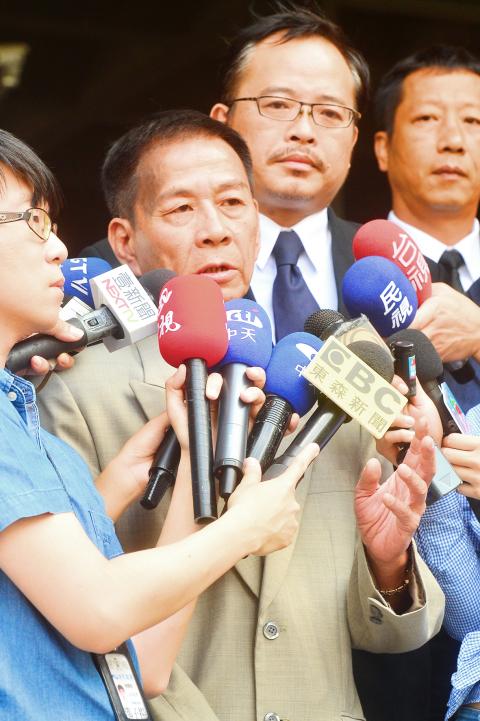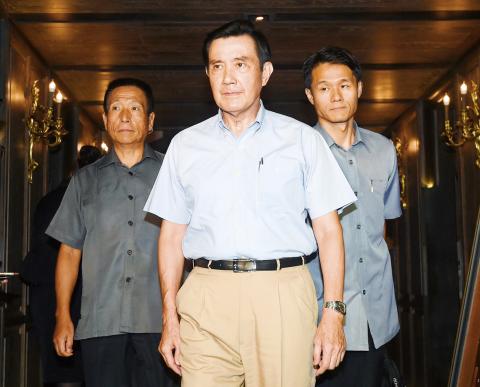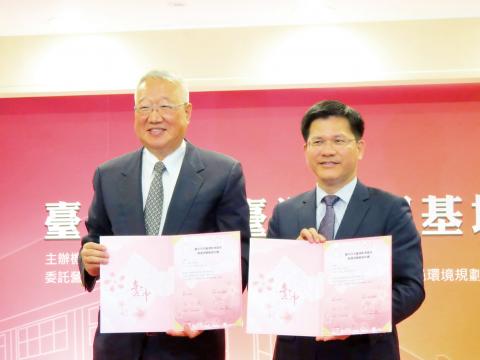Weng Ping-yao (翁炳堯) yesterday said he was instructed by former president Ma Ying-jeou (馬英九) and Cheng Uei Precision Industry Co (CUPI, 正崴) chairman Gou Tai-chiang (郭台強) to kill then-Chinese Nationalist Party (KMT) legislator Alex Tsai (蔡正元) amid a power struggle a decade ago as groups fought for control of the party’s assets.
Weng — who was convicted of firing a gun outside Tsai’s office in Taipei’s Nangang District (南港) on July 28, 2007 — said that KMT officials promised him NT$320 million (US$10.56 million at the current exchange rate) to kill the lawmaker.
He implicated Ma and Gou — who is the younger brother of Hon Hai Precision Industry Co (鴻海精密) chairman Terry Gou (郭台銘); — as well as Lor Yu-chen (羅玉珍), the wife of Gou Tai-chiang; former Central Motion Picture Corp (CMPC, 中影) vice president Chuang Wan-chun (莊婉均); and KMT stalwart Lee Chuan-chiao (李全教).

Photo: Wang Yi-sung, Taipei Times
Accompanied by attorney Chou Wu-jung (周武榮), Weng went to the Taipei District Prosecutors’ Office, saying he wanted to confess to perjury and to ask prosecutors to reopen the investigation of the shooting.
Weng said he has evidence regarding “the plot to bump off Alex Tsai.”
After telling reporters that he would file a lawsuit against “the masterminds of the plot,” Weng entered the prosecutors’ office.

Photo: Liao Chen-huei, Taipei Times
He was released later in the day, with instructions not to leave his residence.
Weng told reporters that he was just “a hired gun, a small potato” in the case and wanted the truth to come out.
The KMT at the time of the shooting was electing members to its Central Standing Committee and other executive positions.

Photo: Su Chin-feng, Taipei Times
There was an intense power struggle over party assets, with the sale of CMPC and other KMT-controlled media companies at the center of a clash between Ma, who was president and KMT chairman at the time, and Tsai, who was the chairman of CMPC at the time, Weng said.
“Tsai refused to resign as CMPC chairman, so Ma struck a deal with Gou Tai-chiang, Lor and Chuang according to which those three would take control of CMPC,” Weng said.
“I was instructed to bump off Tsai,” he said. “It was reasoned that if Tsai was killed, then Gou Tai-chiang would become CMPC chairman.”
Weng said that Lee, who at the time was speaker of the Tainan County Council, brokered the deal to hire him to carry out the assassination.
Weng has a checkered past as a gang member in Tainan and has managed companies in Vietnam.
“I was promised a payment of NT$320 million if I killed Tsai,” he said. “That amount was agreed upon, as it was 10 percent of CMPC’s assessed value of NT$3.2 billion.”
He said the deal broke down when he was asked to also kill Wu Chien-pao (吳健保), a leading KMT figure in Tainan, but was convicted for his involvement in an underground baseball gambling syndicate.
With the deal breaking down, Weng only fired shots at Tsai’s office, he said.
He said he was cheated out of money, only receiving NT$20 million.
“During the trial, I gave false accounts and mislead prosecutors to protect Ma, Gou Tai-chiang and others, but now I want to clear up the facts of the case and let the public know the real masterminds behind the plot,” Weng said.
Ma’s office spokeswoman Hsu Chiao-hsin (徐巧芯) said there is no factual basis and no evidence to Weng’s allegations, adding that Ma had nothing to do with the shooting incident at Tsai’s office.
“It is absurd to the extreme that Ma should be a defendant in this case,” Hsu said. “Ma was not involved, but some people just want to stir up trouble.”

AGING: As of last month, people aged 65 or older accounted for 20.06 percent of the total population and the number of couples who got married fell by 18,685 from 2024 Taiwan has surpassed South Korea as the country least willing to have children, with an annual crude birthrate of 4.62 per 1,000 people, Ministry of the Interior data showed yesterday. The nation was previously ranked the second-lowest country in terms of total fertility rate, or the average number of children a woman has in her lifetime. However, South Korea’s fertility rate began to recover from 2023, with total fertility rate rising from 0.72 and estimated to reach 0.82 to 0.85 by last year, and the crude birthrate projected at 6.7 per 1,000 people. Japan’s crude birthrate was projected to fall below six,

US President Donald Trump in an interview with the New York Times published on Thursday said that “it’s up to” Chinese President Xi Jinping (習近平) what China does on Taiwan, but that he would be “very unhappy” with a change in the “status quo.” “He [Xi] considers it to be a part of China, and that’s up to him what he’s going to be doing, but I’ve expressed to him that I would be very unhappy if he did that, and I don’t think he’ll do that. I hope he doesn’t do that,” Trump said. Trump made the comments in the context

SELF-DEFENSE: Tokyo has accelerated its spending goal and its defense minister said the nation needs to discuss whether it should develop nuclear-powered submarines China is ramping up objections to what it sees as Japan’s desire to acquire nuclear weapons, despite Tokyo’s longstanding renunciation of such arms, deepening another fissure in the two neighbors’ increasingly tense ties. In what appears to be a concerted effort, China’s foreign and defense ministries issued statements on Thursday condemning alleged remilitarism efforts by Tokyo. The remarks came as two of the country’s top think tanks jointly issued a 29-page report framing actions by “right-wing forces” in Japan as posing a “serious threat” to world peace. While that report did not define “right-wing forces,” the Chinese Ministry of Foreign Affairs was

PREPAREDNESS: Given the difficulty of importing ammunition during wartime, the Ministry of National Defense said it would prioritize ‘coproduction’ partnerships A newly formed unit of the Marine Corps tasked with land-based security operations has recently replaced its aging, domestically produced rifles with more advanced, US-made M4A1 rifles, a source said yesterday. The unnamed source familiar with the matter said the First Security Battalion of the Marine Corps’ Air Defense and Base Guard Group has replaced its older T65K2 rifles, which have been in service since the late 1980s, with the newly received M4A1s. The source did not say exactly when the upgrade took place or how many M4A1s were issued to the battalion. The confirmation came after Chinese-language media reported